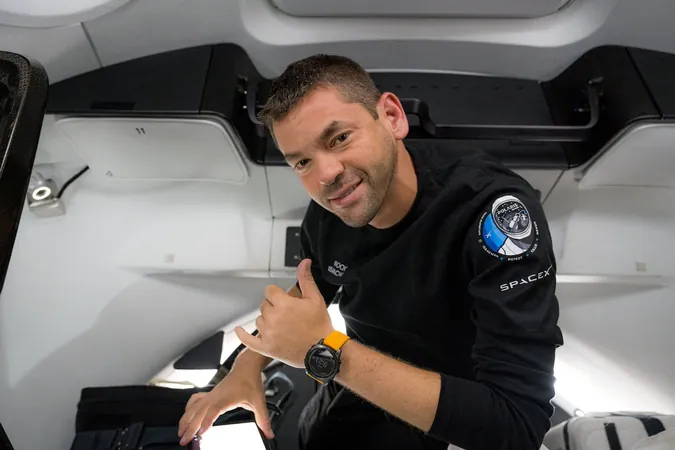
Can Billionaire Space Pioneer Jared Isaacman Propel NASA into the Future?
2024-12-09
Author: Jia
Introduction
For over six decades, NASA has led the charge in space exploration, pioneering missions with interstellar probes and Martian rovers while launching groundbreaking telescopes to uncover the secrets of the universe. However, the agency now finds itself grappling with numerous challenges, including budget cuts, a labyrinthine bureaucracy, and the intense competition from private sector players escalating the pace of space travel.
"I fear NASA is operating on a 'going out of business' strategy," remarked Casey Dreier, Chief of Space Policy at The Planetary Society. The recent nomination of billionaire entrepreneur Jared Isaacman for NASA's administrator position has sparked a mixture of hope and skepticism among space enthusiasts. Many believe that Isaacman's innovative mindset could be precisely what the space agency needs amidst its current struggles. But the pressing question remains: Can Isaacman steer NASA towards a more adaptive and sustainable future, or will he yield to the mounting pressures from commercial interests?
Jared Isaacman's Background
Jared Isaacman, a pioneering tech entrepreneur and seasoned pilot, was nominated by President-elect Donald Trump, pending Senate approval. Isaacman made headlines as the commander of two private missions through SpaceX, including the momentous Inspiration4 mission in September 2021—the first-ever all-civilian crew to orbit Earth. His more recent Polaris Dawn mission showcased a historic commercial spacewalk, further establishing him as a leader in the emerging era of private space travel.
"Isaacman wasn't on many lists of potential candidates, making his nomination certainly unexpected," stated Jack Burns, an astrophysicist at the University of Colorado Boulder, who advised NASA during Trump's previous term. "He represents a departure from traditional NASA leadership, bringing a commercial background to the role."
Challenges Facing NASA
The agency's two most recent administrators hailed from political backgrounds, and previous leaders typically originated from conventional roles within the space sector. "Isaacman's appointment could signal significant changes at NASA," added Burns, emphasizing the urgency for adaptation in these volatile times.
However, NASA's challenges continue unabated. Just a day after Isaacman's nomination, the agency announced further delays in its return to the Moon, causing disappointment but not surprise for those monitoring the Artemis program. A recent report indicated that the Artemis Moon initiative could cost as much as $93 billion from 2012 to 2025, with the Space Launch System rocket's expenses surpassing initial budgetary predictions by $6 billion.
Many experts are questioning the viability of the problematic SLS rocket, suggesting that a radical shift in strategy may be in order. Keith Cowing, an astrobiologist and former NASA employee, commented, "The SLS is years behind schedule, massively over budget, and set to launch infrequently—it's prime for reevaluation."
The Need for Recalibration
The report "NASA at a Crossroads" highlights the pressing issues the agency faces: aging infrastructure, technological stagnation, tight budgets, and an increasingly challenged talent pool. This has led experts to concur on the necessity for a recalibration of priorities within NASA. "The agency needs a definitive vision for its future," Cowing added, noting that numerous private companies are now capable of launching missions into space—a domain that used to be NASA's exclusive territory.
With this competition, NASA's role could shift towards ambitious scientific inquiries and exploration endeavors in deep space. Dreier emphasized, "NASA embodies a unique set of responsibilities to the public that commercial entities often overlook. Scientific exploration isn't necessarily profitable; it’s about knowledge and understanding."
Concerns About Commercialization
While Isaacman's experience in commercial spaceflight brings invaluable insight, concerns loom about potentially prioritizing commercial gains over NASA's fundamental research missions. "His history as a commercial space customer suggests he may favor private ventures," Dreier expressed. Yet, he noted the reality that as NASA administrator, Isaacman will operate within a structured framework of federal oversight, meaning he won't have unilateral authority to overhaul budgets or award contracts without due process.
Conclusion
The nomination of Jared Isaacman stands as a pivotal moment for NASA as it navigates the era of modern space exploration. Will he be the visionary leader to catapult NASA into a new age of discovery, or will his commercial background tether the agency to the confines of the marketplace? The future is uncertain, but one thing is clear: the stakes have never been higher.


 Brasil (PT)
Brasil (PT)
 Canada (EN)
Canada (EN)
 Chile (ES)
Chile (ES)
 España (ES)
España (ES)
 France (FR)
France (FR)
 Hong Kong (EN)
Hong Kong (EN)
 Italia (IT)
Italia (IT)
 日本 (JA)
日本 (JA)
 Magyarország (HU)
Magyarország (HU)
 Norge (NO)
Norge (NO)
 Polska (PL)
Polska (PL)
 Schweiz (DE)
Schweiz (DE)
 Singapore (EN)
Singapore (EN)
 Sverige (SV)
Sverige (SV)
 Suomi (FI)
Suomi (FI)
 Türkiye (TR)
Türkiye (TR)